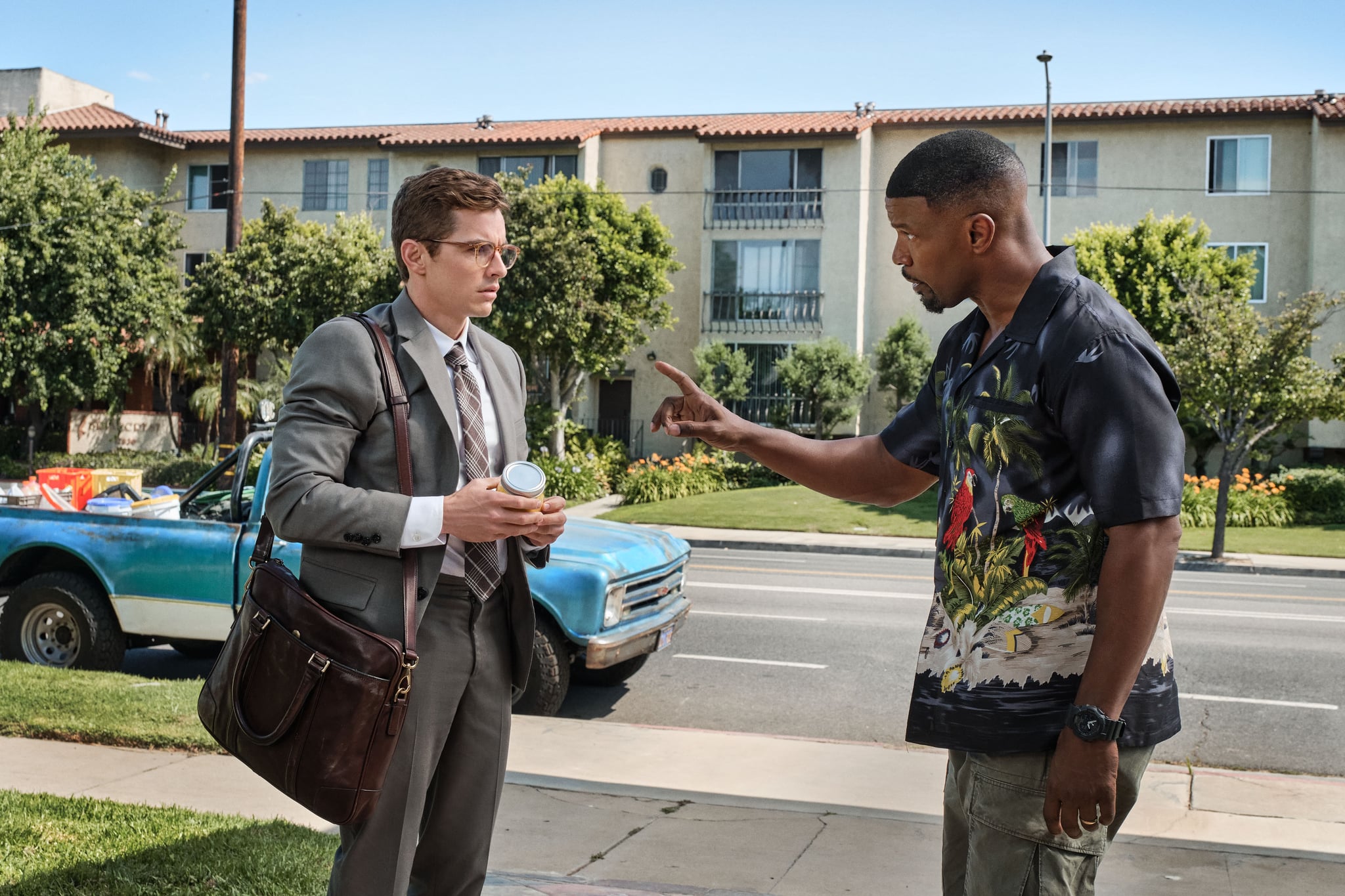In broad daylight, Netflix’s Day Shift appears as a run-of-the-mill buddy comedy about hunting vampires in the San Fernando Valley. Lurking in its shadows is a pretty savvy social satire about the socioeconomic terrain of Southern California. Driving around the sun-soaked valley in a rundown Valley Pool Services truck, Bud (Jamie Foxx) pretends to clean pools. Perhaps, he sometimes does—we do see him remove a raccoon from a pool in the very first scene. But the pool-cleaning gig is really a front for another blue-collar gig: hunting vampires.
The plot’s dramatic exigency is set into motion as Bud returns home to learn he has seven days to come up with enough money to pay for his daughter’s private schooling and braces. If he can’t come up with the money, his ex-wife is threatening to move to Florida. It is a formulaic catalyst that has been utilized by innumerable movies. But it works wonders here—turning our hard-working, estranged father into a sacrificial laborer. It’s the perfect trope as it makes the blood, sweat, and tears of Bud’s hustle appear noble, selfless, and heroic.
Unfortunately, money isn’t easy to come by for those stuck within the blue-collar caste. And we soon see just how stacked the cards are against Bud. As a non-union vampire Hunter, Bud must pawn off his fangs at the local pawnshop. Unfortunately, this is a world of petty negotiations and superficial caviling. The pawn broker quibbles about the age of the defanged vampire, points out cigarette stains, and so forth.
Bud is thus forced to return to the vampire hunting union—a bureaucracy that offers higher returns at the expense of stifling supervision and red tape. There’s history to add to the tension, as well—Bud’s aggressive, unorthodox hunting style has already made him an outcast of the union. But with the help of Big John Elliot (a cowboy-costumed Snoop Dogg in leather boots and a ten-gallon hat), and some steady supplication, Bud gets a second chance.
There’s a key stipulation, though—Bud must team up with Seth (Dave Franco), a bookish clerk at the union. Seth’s role, however, is not to assist Bud in any way. Like most white-collar figures, he is instead tasked with the pedantic responsibility of serving as Bud’s scrupulous overseer—sent out to shadow and to nitpick Bud’s infractions. The antagonistic professional frictions that emerge between the two easily become the most inspired interpersonal dynamics of the film.
From the get-go, Seth accurately embodies a desk-job acolyte—we meet him wearing a Juniper-green summery suit while stationed behind an ergonomic desk. His role, to start the film, resembles that of a bank teller (exchanging vampire fangs for lump sums of money). Bud’s hopes of getting a fair kickback doesn’t fare much better where than it did at the pawn shop: Seth’s fastidious loyalty to the union’s bylaws, banking fees, tax cuts, and paltry discounts (a 15% off coupon at the Cheesecake Factory) show him as a sycophantic goody-two-shoes. Hoping to ascend the hierarchical ladder, he’s cravenly subsumed within the union’s corporate ideology.
Of course, the significant irony to this scenario is that the union, which was ostensibly established to protect workers’ rights, has become antithetically exploitative of its primary constituency. Seth may be innocently sheltered and dumb, but his symbolic position in the system makes him the furthest thing from Bud’s ally. As a figurehead for the union, he doesn’t want to help the laboring class so much as overtax them for a safe, easy cut of their hard-earned money. Only after Seth is forced to tag along with Bud does he begin to see the light—humbled and reawakened to his role as a privileged executive sucking up the currency produced by toiling proletariats.

Here, Day Shift taps into one of the most prevalent inequities in modern America—the manner in which an ignorant and lazy corporate class not only dictates the grueling work conditions of the layman but also has the audacity to take the biggest cut. Seth’s shock and horror is a testament to how oblivious the business class can be about the dire conditions of those working the front lines in most industries.
In one scene, Bud defends his unconventional vampire hunting style in a rejoinder to Seth’s constant carping—“I haven’t read the book. I’m out here living it.” This disgruntled retort concisely summarizes the garbled asymmetry between policy and practice. Seth may be able to recite code and verify violations—nitpick the menial worker—but he has no understanding of how the codes and violations actually affect the job itself. He’s thus but another naïve, ignorant bureaucrat upholding orders without experiential understanding.
Of course, Seth isn’t incapable of undergoing a change of heart and contributing. Despite initially scribbling down Bud’s demerits in breaking protocol, he eventually begins to realize just how inhumane and arrogant his supervision is in the grand scheme of things. He realizes he should be fortunate to enjoy any cut as a white-collar pansy—infantilized by his inability to handle the stress of vampire hunting without peeing his slacks. He’s enlightened by the grueling and perilous hazards of the hunt—imbued with newfound empathy for the field worker.
Seth is ultimately quite likable. In essence, he’s just a cowardly, amiable geek—a nice kid who wants to enjoy his yogurts and bran muffins unbothered. Blindly following orders, he is but an unwitting cog in the corporate machinery. He just needs to be given a hefty dose of visceral, week-in-the-life reality. It is important to point out that Seth’s vast knowledge of vampire classifications and union loopholes does come in handy, as well. Thus, by the end of Day Shift, we get an idealized Marxist reunification—the development of a mutual respect between the worker and the lawmaker, between the hands-on tactician and the suit-adorned strategist.

Where Day Shift falters is in its flimsy setup of the vampires. Frustratingly, when it comes to the bloodsucking populace, the script’s nascent narrative themes and threads fail to get fully fleshed out. For one, the vampires are just a random collection of citizens living among the greater community. There’s little detail explaining how they’re sniffed out, how they manage to cohabitate among other citizens, or what their role in greater society actually is.
I thought of a few possibilities during the film’s runtime alone. The writers could have pigeonholed the vampires as stock brokers, trust-fund babies, pension-guzzling retirees, welfare leeches, or best of all, landlords. It almost seems like the screenwriters wanted to designate such roles for the vampire class (the targets include an old lady, a hive vampire home filled with gamers, etc.). Unfortunately, these ideas aren’t delineated well enough. Instead of socioeconomic archetypes and subtext, we get silly vampiric categorizations (Southerns, Familiars, Spiders, Ubers, etc.) and obligatory reinventions of vampire hunting weaponry (garlic grenades, silver wiring, etc.).
The landlord motif would have been the most potent through line of all. After all, this is a film about people taking cuts they don’t truly deserve. Who is more guilty of this than landowners—serving as the feudal lords of modern society. This approach would have paralleled the real estate subtext of Inherent Vice quite nicely, and it seems to have been on the top of the screenwriters’ tongues. In fact, realty is touched upon quite explicitly via the character development of the vampire ring-leader/baddie Audrey (Karla Souza). It just never fully comes to fruition.

Audrey, after all, is introduced as a realtor breaking ground at a new suburban subdivision. She tells a vampire, strapped to the home’s foundation, that she has big plans for expanding the valley’s sprawl over the next century, seconds before the victim is covered in wet cement. Leaving the site, she smarmily wonders to herself “Why rent when you can own?” Clearly, Audrey represents the evil forces of gentrification and land ownership. Or does she? We also learn Audrey is trying to buy as much land as possible to let Vampires move back into the valley. She is sick of her class being maligned to living in the shadows. Her agenda is easy to sympathize with, which becomes problematic for the story.
I just wish Audrey was given a more detailed backstory and overall treatment. We later learn she laments the shift of vampires devolving from worshipped gods to a persecuted class, and wants to restore their former glory. If all the vampires were landlords or realtors, this could have worked wonderfully as a commentary on the souring of the zeitgeist (especially post-Covid) toward those who own property and charge monthly rental fees. Moreover, Bud’s situation could have better aligned with the overarching narrative had his goal been to pay off mortgage or property rental debts instead of securing funds for his daughter’s braces.
The setup is there for the taking. As a pool-cleaner, Bud gets unique access to the upper-crust homes across the valley. We get to see the wealthy living in their spoiled suburban enclaves. And in many ways, there’s no bigger villain, in any quasi-Marxist themed storyline, than the class of slovenly parasites who silently and quietly glean the spoils and excesses of everyone else’s hard work. Day Shift maps the socioeconomic topography of Southern California quite nicely. It just needed to stick to its guns—revealing the deeply embedded cabal of deed and lien holders working behind the scenes in a skin-scorching, metaphorical exposé.


